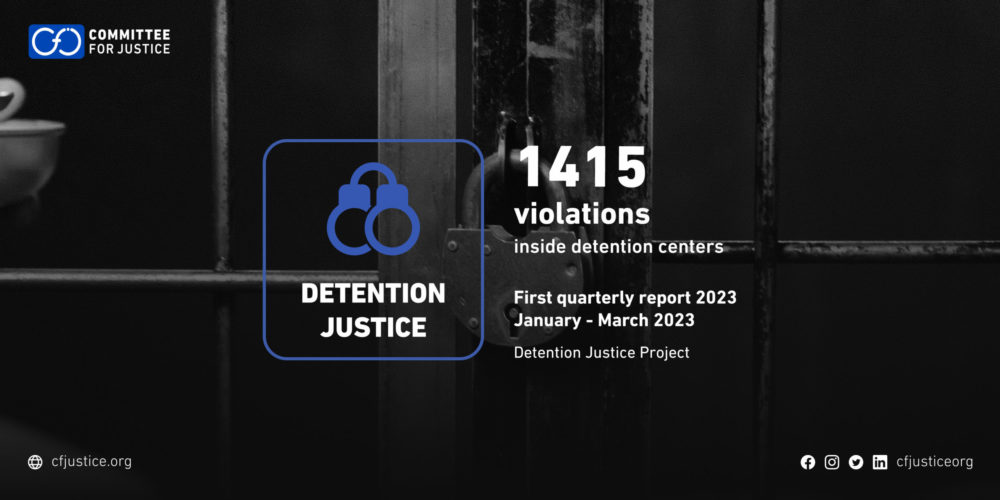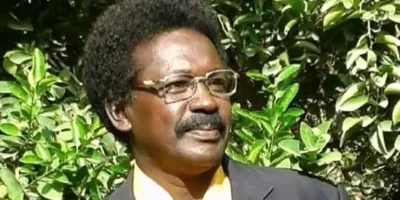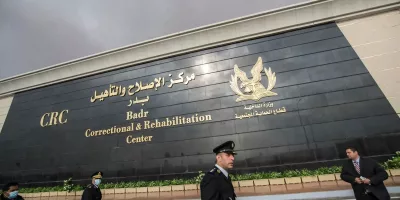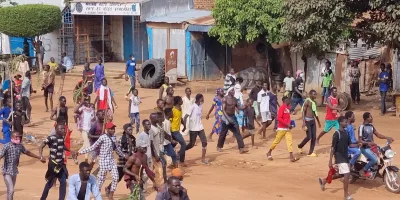The Committee for Justice (CFJ) has released its first quarterly report for 2023. The report highlighted that Egypt witnessed an escalation of repression coinciding with the severe economic crisis it faced in the first quarter of 2023. Security agencies continued to target citizens, opposition figures, and those with opinions, as well as pursuing workers who organized labor strikes in protest of low wages. This occurred simultaneously with the preparations for the sessions of the national dialogue announced in April 2022. Additionally, public discussions began regarding the upcoming presidential elections in 2024 and the elections for the Journalists Syndicate.
1415 violations in 3 months:
The report, part of the Detention Justice project, documented 1415 violations, which were distributed among various categories. The highest percentage of violations, approximately 89% of the total documented ones (1273), fell under arbitrary deprivation of liberty. There were also 65 cases of enforced disappearances, 50 violations related to poor detention conditions, including intentional denial of healthcare, 16 cases of torture, and 10 cases of deaths within detention facilities.
The documentation activities covered 12 Egyptian governorates, with Cairo having the highest number of violations, where 962 violations were recorded. Police stations and centers topped the list of locations where these observed violations occurred, with a total of 174 documented violations. The victims primarily consisted of activists, members of political parties, and engineers, with 15 documented violations. Detainees in pretrial detention facing State Security Prosecution had the highest number of violations among the documented cases.
Human rights crisis persists despite presidential promises:
The report noted that the human rights crisis in Egypt, despite promises made in the previous year such as the national dialogue and the reactivation of the presidential pardon committee, has not come to an end. Security authorities continued with their usual approach in dealing with citizens affected by the economic conditions, resorting to the use of violent security solutions. This resulted in the targeting of citizens and content creators who expressed their opinions and grievances about the economic situation and the cost of living.
Three online content creators were arrested for sharing satirical content about the general conditions. Additionally, security forces arrested nine workers from the “Kryazi” company, and the prosecution decided to detain them for 15 days on charges of unauthorized assembly and calling for a strike to disrupt work, before releasing them later on.
Death and life sentences:
In terms of judicial developments, Egyptian courts issued a range of final and preliminary verdicts, including death sentences, life imprisonment, and lengthy prison terms for individuals involved in politically motivated cases. Harsh sentences were handed down, ranging from 15 years to 5 years, against lawyers and human rights activists in the “Coordination Case.” Life sentences were also pronounced against 39 defendants in the Joker Case, in addition to sentences ranging from 5 to 15 years for 22 minors who were between 15 and 17 years old at the time of their arrest in September 2019.
In the case known in the media as the “New Cairo Cell,” the Emergency State Security Felonies Court sentenced 6 defendants to death by hanging, while the seventh defendant received a life sentence.
Miserable detention conditions:
The report also addressed the miserable detention conditions within several detention facilities in Egypt, such as the Badr Al-Jadeed Prison Complex, where numerous cases of suicide have been documented due to the dire conditions inside. Additionally, it highlighted conditions in the Tora Prison Complex, the Qanater Men’s Prison, and the Qanater Women’s Prison. The report documented and verified numerous cases of detainees in these facilities experiencing deteriorating health conditions as a result of the poor detention conditions and deliberate medical neglect.
Services provided to victims:
Regarding the services provided to victims, CFJ, through its United Nations Communications Team, submitted 23 complaints and correspondences and held meetings related to victims and updates on the human rights situation in Egypt with various United Nations bodies and teams. These included the Working Group on Arbitrary Detention, the Working Group on Enforced Disappearances, the Special Rapporteur on the Situation of Human Rights Defenders, the Special
Rapporteur on Extrajudicial, Summary, or Arbitrary Executions, and the Special Rapporteur on the Promotion and Protection of the Right to Freedom of Opinion and Expression.
As a result of the correspondence and efforts of the organization’s team, several notable successes were achieved during the reporting period. Among the most prominent outcomes were the report issued by the Human Rights Committee on Egypt after examining its file with the participation of CFJ. Additionally, the Special Rapporteur on the Situation of Human Rights Defenders at the United Nations issued a memorandum expressing grave concerns about the repeated enforced disappearances, torture, ill-treatment, and medical neglect of Egyptian human rights defender Dr. Ahmed Shoukry Abdel Sattar Mohamed Amasha. Furthermore, human rights experts affiliated with the United Nations called on the Egyptian authorities, in a memorandum, to ensure the provision of appropriate and timely healthcare to former presidential candidate Dr. Abdel Moneim Aboul Fotouh, given the severe deterioration of his health, and to conduct effective investigations and assessments of the circumstances surrounding his detention and deprivation of liberty.
Recommendations:
CFJ recommends the release of prisoners of conscience and those who have been detained for more than two years without trial or an investigation based on incriminating evidence. It also calls for their social reintegration as compensation for the extended periods of detention they and their families have endured.
Additionally, the organization calls for allowing local and international civil society organizations to conduct regular visits to monitor conditions inside detention centers. The committee urges serious and transparent investigations to hold those responsible for violations accountable, a halt to the execution of unjust court judgments issued during the reporting period, and a retrial of the accused.
The organization further requests Egyptian authorities to initiate serious investigations into cases of torture, enforced disappearances, and deliberate denial of healthcare to the victims documented in the report. It emphasizes the necessity of implementing the recommendations outlined in the final report on Egypt issued by the UN Human Rights Council.






